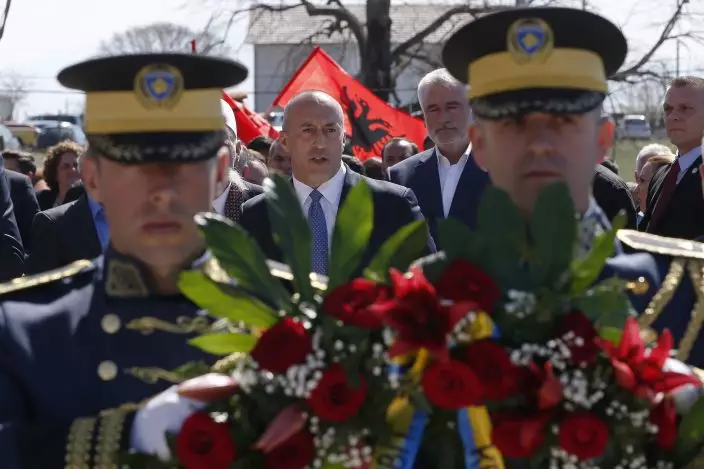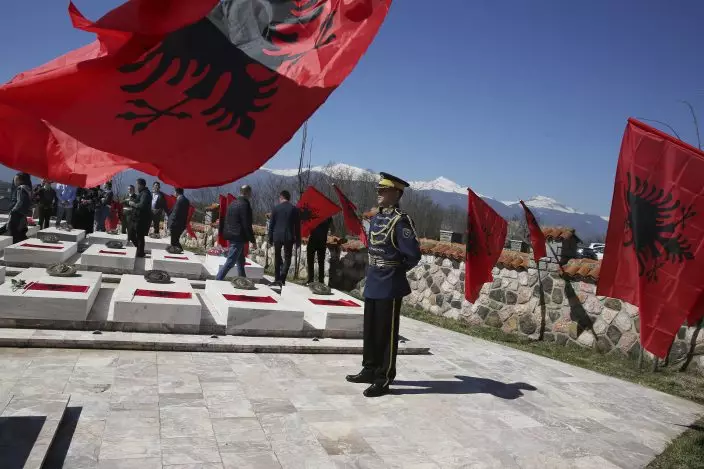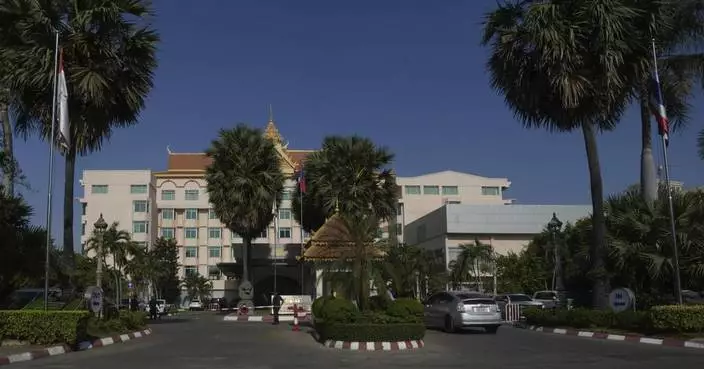Twenty years after NATO intervened to stop Serbia's onslaught in Kosovo, Belgrade on Sunday commemorated the victims of what it says was an aggression while Kosovo hailed the beginning of its national liberation.
The staunchly opposed views of the two former war foes reflect persisting tensions over Kosovo, a former Serbian province whose 2008 declaration of independence Serbia still does not recognize.
Thousands of people gathered Sunday evening in the southern Serbian city of Nis for the main remembrance event featuring top state officials. President Aleksandar Vucic said in a speech that Serbia will never forget its victims.

A Kosovo Albanian boy visits the graves at a memorial complex during the 20th anniversary of the NATO bombing in the village of Glogjan, Kosovo on Sunday, March 24, 2019. Kosovo on Sunday celebrated the 20th anniversary of the NATO bombing as the start of their freedom and independence victory. Many killings from then-Serb leader Slobodan Milosevic were a major factor in NATO's decision to launch an air campaign against Serbia to end Kosovo's 1998-99 war. (AP PhotoVisar Kryeziu)
"Yes, it was a crime!" Vucic said of the bombing campaign. "No one has been held responsible for these crimes. Serbian civilians, our children, were a permitted target of the NATO aggression."
Anti-NATO sentiments remain high in Serbia even as the country seeks European Union entry. Vucic reiterated Serbia won't join the Western military alliance.
Earlier on Sunday, Serbian far-right supporters burned NATO and EU flags in Belgrade, condemning the 78-day bombing that ended the country's rule over the territory many here view as their nation's historic heartland.

Kosovo prime minister Ramush Hardinaj places flowers on graves during the 20th anniversary of the NATO bombing in the village of Glogjan, Kosovo on Sunday, March 24, 2019. Kosovo on Sunday celebrated the 20th anniversary of the NATO bombing as the start of their freedom and independence victory. Many killings from then-Serb leader Slobodan Milosevic were a major factor in NATO's decision to launch an air campaign against Serbia to end Kosovo's 1998-99 war. (AP PhotoVisar Kryeziu)
Wreath-lying commemorations also were held throughout the day.
Rights groups say several hundred people died in the NATO bombing, while Serbia says the number of victims was much higher. The bombing also destroyed much of Serbia's infrastructure.
In Kosovo, leaders said NATO's air war brought freedom for their people as they paid their respects to the victims of the 1998-99 war that killed more than 10,000 people.

A member of the Kosovo Security Force honor guard stands at the memorial complex as Kosovo Albanians attend the 20th anniversary of the NATO bombing in the village of Glogjan, Kosovo on Sunday, March 24, 2019. Kosovo on Sunday celebrated the 20th anniversary of the NATO bombing as the start of their freedom and independence victory. Many killings from then-Serb leader Slobodan Milosevic were a major factor in NATO's decision to launch an air campaign against Serbia to end Kosovo's 1998-99 war. (AP PhotoVisar Kryeziu)
"It is wonderful that Kosovo's people are free and children can grow up at their home and can go to their schools and that's only thanks to NATO air campaign," Prime Minister Ramush Haradinaj told The Associated Press.
Serbia and Kosovo have been told they must normalize relations in order to advance in their bids to become members of the EU, but the EU-mediated talks have stalled amid tensions.
Several Western embassies in Belgrade on Sunday issued a joint statement of condolence for the victims of the bombing, pledging to "work even harder to contribute to lasting peace and stability to the region."
"We remember March 24 as the day diplomacy failed, and we express our sincere regret for the loss of civilian lives during the events of 1999," said the statement. "We are saddened for all of those who lost their loved ones during the wars of the 1990s."
Llazar Semini contributed from Tirana, Albania.
NEW YORK (AP) — Even as many Americans say they learn about the 2024 election campaign from national news outlets, a disquieting poll reveals some serious trust issues.
About half of Americans, 53%, say they are extremely or very concerned that news organizations will report inaccuracies or misinformation during the election. Some 42% express worry that news outlets will use generative artificial intelligence to create stories, according to a poll from the American Press Institute and The Associated Press-NORC Center for Public Affairs Research.
The poll found 47% of Americans also expressing serious concern that news outlets would report information that has not been confirmed or verified, and 44% worry that accurate information will be presented in a way that favors one side or another.
Half of Americans say they get election news always or frequently from national news outlets, a percentage that is higher among older respondents, the poll found.
“The level of engagement is good,” said Michael Bolden, CEO of the American Press Institute. “The thing that's most concerning is that they're not sure they can actually trust the information.”
Years of suspicion about journalists, much of it sown by politicians, is partly responsible, he said. People are also less familiar with how journalism works. The poll found about half of respondents say they have at least a moderate amount of confidence in the information they receive from either national or local news outlets when it comes to the 2024 elections, though only about 1 in 10 say they have a great deal of confidence.
“There may have been a time when people knew a journalist because one lived on their block,” Bolden said. “The way the industry has been decimated, that's much less likely.”
Simply putting out the news often isn't good enough anymore, he said. There's a growing disconnect between news organizations and communities that the outlets need to address, by helping to let people know what journalists do and how people reporting news are their friends and neighbors, he said.
Outlets should lean into a convenor role, bringing people together for newsworthy events, he said.
About half of U.S. adults say they follow the news about presidential elections closely, with older adults being more engaged. About two-thirds of Americans age 60 or older say they keep a close eye on presidential election news, compared wth roughly one-third of those under age 30.
The same trend is seen with local and state election news. While the poll found that 46% of Americans age 60 or older say they follow news about local and state elections closely, only 16% of people age 18 to 29 said the same thing.
“As they transition to becoming older people, will they begin to care?” Bolden asked. “If they don't begin to care, what will that mean for local and state communities?”
Young people, those under age 30, are about as likely to get election news from social media or friends or family as they are to get it from national or local news outlets, the poll found. Black and Latino adults are somewhat more likely to express “a great deal” of confidence in the reliability of social media as a source of election news than white Americans are.
That's both a warning sign, since there is a lot more misinformation to be found on social media, and an opportunity for traditional outlets to make more of their work available this way, Bolden said.
About 6 in 10 Democrats say they get election news from national outlets at least frequently. That's more than the 48% of Republicans or 34% of independents, according to the poll. Republicans are more likely than Democrats and independents to express concern about inaccurate information or misinformation in news coverage during the upcoming elections. About 6 in 10 Republicans are concerned about this, compared with about half of Democrats.
Besides inaccuracies, many also expressed serious concern about election news that focuses too much on division or controversies or concentrates on who may win or lose — the horserace aspect of political coverage — rather than issues or the character of candidates.
Most Americans say that for them to make informed decisions about the 2024 state and local elections, they want national and local news outlets to highlight candidates’ values or their different positions on key social issues. In each case, about three-quarters of U.S. adults say they would like “a lot” or "some" coverage of these topics.
The poll of 2,468 adults was conducted March 21-25, 2024, using a sample drawn from NORC’s probability-based AmeriSpeak Panel, which is designed to be representative of the U.S. population. The margin of error is plus or minus 2.9 percentage points.
David Bauder writes about media for The Associated Press. Follow him at http://twitter.com/dbauder.

FILE - Journalists line the press stand before Republican presidential candidate former President Donald Trump speaks at a caucus night party in Des Moines, Iowa, Jan. 15, 2024. Attitudes toward the media and political news ahead of the election were explored in a poll from the American Press Institute and The Associated Press-NORC Center for Public Affairs Research. (AP Photo/Andrew Harnik, File)













